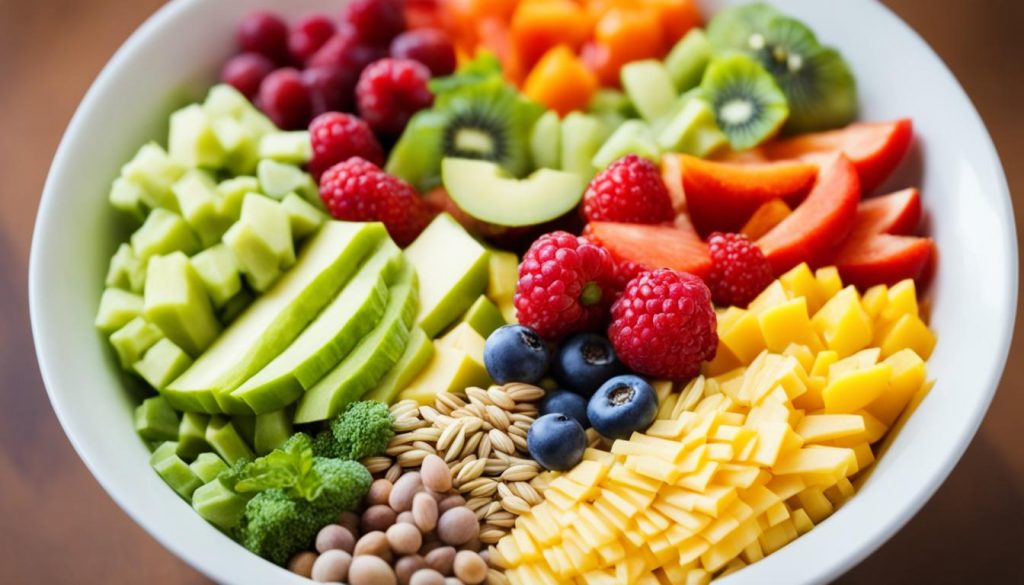Are you tired of trying countless diets and exercise routines without seeing the results you desire? Have you considered turning to quick weight loss supplements to help you shed those extra pounds? While it may seem tempting, it’s essential to separate fact from fiction when it comes to weight loss supplements. Do they really work, or are they just another gimmick?
In this article, we will explore the role of weight loss supplements, examine the potential benefits of certain vitamins and minerals, and provide insights into the effectiveness of popular supplements on the market. Let’s uncover the truth about quick weight loss supplements and arm you with the knowledge you need to make informed choices.
Key Takeaways:
- Weight loss supplements may not have sufficient scientific evidence to support their claims.
- Building and maintaining a healthy lifestyle is crucial for sustainable weight loss.
- Certain vitamins and minerals can support healthy weight management.
- Consulting with a healthcare professional is essential before starting any supplement regimen.
- There is no magic pill for weight loss, and long-term lifestyle changes are key to achieving lasting results.
The Role of Weight Loss Supplements
Weight loss supplements are products that come in different forms, such as pills, powders, capsules, or liquids, and are meant to aid in weight loss. They may claim to work by improving carbohydrate metabolism, increasing fat-burning or energy expenditure, and reducing feelings of hunger.
However, it is important to note that over-the-counter weight loss supplements are not regulated by the FDA and may lack high-quality clinical studies on their efficacy. While some supplements may provide short-term benefits, it is crucial to approach them with caution and consider the potential risks and side effects.
Before starting any supplement regimen, it is highly recommended to seek advice from a healthcare professional. They can provide personalized guidance and help determine if weight loss supplements are appropriate for your individual needs and goals.
“Weight loss supplements can be a helpful addition to a weight loss plan, but it’s important to approach them with caution. Always consult a healthcare professional before starting any new supplement regimen.”
While weight loss supplements may offer some support, it is important to remember that they are not a magic solution or substitute for a healthy lifestyle. Sustainable weight loss is best achieved through a combination of a balanced diet, regular exercise, and other lifestyle modifications.
It is essential to prioritize overall health and well-being when embarking on a weight loss journey. By focusing on long-term behavior changes, effective weight management products can be integrated into a comprehensive approach to achieve and maintain a healthy weight.
When considering weight loss supplements, it is important to be well-informed and cautious. Look for reputable brands that prioritize safety and transparency. Keep in mind that rapid weight loss pills or extreme claims are often too good to be true. Aim for products that have undergone third-party testing and have positive reviews and testimonials from real users.
In the next sections, we will explore specific vitamins and minerals that may support weight loss and discuss some top-rated diet supplements to consider.
Vitamins and Minerals for Weight Loss
Certain vitamins and minerals play a crucial role in supporting a healthy weight. While it is ideal to obtain these nutrients through a balanced diet, sometimes taking supplements can be beneficial, especially if you are not getting enough through food alone. Here are some key vitamins and minerals that act as natural weight loss supplements and efficient slimming aids:
Multivitamins
Multivitamins are comprehensive supplements that contain a combination of essential vitamins and minerals. They can help support overall health and wellbeing, including weight management. Many multivitamins contain a blend of nutrients that promote metabolism, provide energy, and support a healthy immune system. Incorporating a high-quality multivitamin into your daily routine can be an effective way to ensure your body receives the necessary nutrients for weight loss.
Magnesium
Magnesium is a vital mineral that contributes to various body functions, making it an efficient slimming aid. It plays a crucial role in energy production, protein synthesis, and carbohydrate metabolism. Inadequate magnesium levels have been associated with weight gain and difficulty in losing weight. Incorporating a magnesium supplement, such as magnesium citrate or magnesium glycinate, may help maintain a healthy weight by supporting these essential processes.
B Vitamins
B vitamins, including vitamin B3 (niacin) and vitamin B12, are essential for optimal health and can act as efficient slimming aids. They contribute to energy production, metabolism, and the breakdown of carbohydrates. While the research on vitamin B12’s direct impact on weight loss is mixed, maintaining adequate levels of B vitamins is crucial for overall energy and metabolism. As part of a healthy diet and lifestyle, incorporating foods rich in B vitamins or supplements can support weight management.
Protein Powder
Protein is a vital macronutrient that aids in weight loss by promoting satiety, increasing metabolism, and preserving lean muscle mass. Including a protein powder supplement can be both convenient and effective, especially for those looking to increase their protein intake or adhere to dietary restrictions. Opt for high-quality protein powders, such as whey protein or plant-based options like pea protein or hemp protein, to supplement your diet and support your weight loss efforts.
Fiber
Fiber is a dietary component that offers numerous health benefits, including helping with weight loss. It helps promote feelings of fullness, improves digestion, stabilizes blood sugar levels, and aids in overall weight management. While it’s best to obtain fiber through whole foods like fruits, vegetables, and whole grains, incorporating a fiber supplement can be beneficial if your diet lacks sufficient fiber intake. A fiber supplement, such as psyllium husk or glucomannan, can address dietary gaps and support efficient weight loss.
Remember, natural weight loss supplements, such as vitamins and minerals, can aid in weight management when combined with a healthy diet and regular exercise routine. However, it’s always essential to consult with a healthcare professional before starting any supplement regimen to ensure it aligns with your specific needs and goals.
Multivitamins for Weight Loss
Multivitamins are an essential part of any diet to ensure that your body receives all the necessary vitamins and minerals for optimal health. When it comes to weight loss, a quality multivitamin can provide important minerals and B-vitamins, which play a significant role in energy metabolism. These nutrients support the conversion of food into energy and help regulate your body’s metabolic processes.
One crucial mineral to look for in a multivitamin is iron. Iron is responsible for carrying oxygen to the cells and supporting metabolic processes. When your iron levels are low, you may experience fatigue and have a harder time losing weight. Choosing a multivitamin with iron can help boost your iron levels and support your weight loss journey.
Here are two top-rated multivitamins that can aid in weight loss:
| Brand | Description |
|---|---|
| Nature Made Multivitamin with Iron | A comprehensive multivitamin that contains essential vitamins and minerals, including iron, to support overall health and well-being. |
| Centrum Multivitamin and Multimineral | A popular multivitamin that provides a wide range of essential vitamins and minerals, including iron, for overall health support. |
Remember to consult with a healthcare professional before starting any new supplement regimen to ensure that it aligns with your specific dietary needs and health goals.
Magnesium for Weight Loss
Magnesium is a critical nutrient that plays a vital role in maintaining a healthy weight. It is involved in various metabolic processes that support efficient energy production and utilization in the body. This essential mineral helps convert sugar into energy and supports protein synthesis, which is crucial for muscle growth and repair.
Unfortunately, many adults do not obtain enough magnesium through their diet alone. This deficiency can negatively impact weight management and overall health. Adding a magnesium supplement to your routine may provide significant benefits in supporting your weight loss goals.
Speak with your doctor or healthcare professional to determine if a magnesium supplement is right for you. They can assess your individual needs and guide you in choosing the appropriate dosage and formulation. Remember, it is crucial to select a high-quality supplement from a reputable brand to ensure safety and efficacy.
The Benefits of Magnesium for Weight Loss
Including magnesium supplementation as part of your weight loss journey can offer several advantages:
- Enhanced energy production: Magnesium plays a key role in converting food into energy. By supporting efficient energy production, this mineral helps you maintain optimal energy levels for regular exercise and physical activity, which are essential for weight loss.
- Improved insulin sensitivity: Magnesium helps regulate blood sugar levels and enhances insulin sensitivity. This can help prevent blood sugar spikes and crashes, promoting a more balanced release of energy and reducing cravings for unhealthy, sugary foods.
- Increased metabolism: Magnesium is involved in metabolic processes that help your body burn calories. It supports a healthy metabolic rate, allowing you to burn calories more efficiently, even at rest.
To further illustrate the benefits of magnesium for weight loss, consider the following table:
| Benefit | Explanation |
|---|---|
| Enhanced energy production | Magnesium helps convert food into energy, supporting an active lifestyle. |
| Improved insulin sensitivity | Magnesium regulates blood sugar levels, reducing cravings and promoting balanced energy levels. |
| Increased metabolism | By supporting metabolic processes, magnesium helps burn calories more efficiently. |
Remember, while magnesium supplements can be beneficial for weight loss, they should not replace a healthy diet and regular exercise. They are designed to complement a holistic approach to weight management.
Consulting with a healthcare professional is essential before starting any new supplement regimen or making significant changes to your current routine. They can provide personalized advice tailored to your unique needs and help you make informed decisions for a successful weight loss journey.
Next, we will explore the role of B vitamins in supporting weight loss.
B Vitamins for Weight Loss
B vitamins, such as vitamin B3 and vitamin B12, can play a vital role in achieving a healthy weight balance. These vitamins are involved in energy production and carbohydrate breakdown, which are essential processes for maintaining an efficient metabolism. By supporting these metabolic functions, B vitamins can contribute to weight management and overall well-being.
However, it is important to note that the research on the relationship between vitamin B12 and weight loss is mixed. Some studies suggest a potential link, while others show limited evidence. Therefore, it is crucial to consult with a healthcare professional before starting any new supplement regimen, including quick slimming tablets containing B vitamins.
While B vitamins can offer potential benefits for weight management, it is essential to remember that they should be part of a holistic approach to health. Incorporating a balanced diet, regular exercise, and other healthy habits are key components of achieving sustainable weight loss and overall well-being.
| Vitamin | Key Functions | Food Sources |
|---|---|---|
| Vitamin B3 (Niacin) | Energy production, carbohydrate and fat metabolism | Tuna, salmon, chicken breast, peanuts, mushrooms |
| Vitamin B12 | Red blood cell formation, nerve function | Beef liver, clams, trout, fortified cereals, milk |
Remember to consult with a healthcare professional or registered dietitian to determine the appropriate dosage and to ensure that the use of B vitamins is suitable for your unique health needs. Their guidance will help you make informed decisions about incorporating quick slimming tablets into your weight loss journey.

Protein Powder for Weight Loss
Protein is a vital nutrient for effective weight loss. It not only helps promote satiety, keeping you feeling full and satisfied, but it also boosts metabolism and supports the growth of lean muscle. Incorporating protein into every meal and snack can be a game-changer in your weight loss journey. However, if you find it challenging to meet your protein requirements through food alone, a protein powder supplement can be a convenient and effective solution.
When choosing a protein powder, it’s crucial to opt for a high-quality product. Look for options that are low in added sugars and artificial additives. Whey protein, plant-based protein (such as pea or soy), and collagen protein are some popular choices. Consider consulting with a healthcare professional to determine the appropriate dosage and find the best protein powder for your specific needs.
Benefits of Protein Powder
- Enhances weight loss by promoting satiety and reducing overall calorie intake
- Boosts metabolism, increasing the number of calories burned
- Aids in the growth and maintenance of lean muscle mass
- Supports muscle recovery and repair after exercise
- Convenient and portable, making it easy to meet your protein needs on-the-go
Remember, protein powder should complement a balanced diet and regular exercise routine. It is not a substitute for whole foods but can be a valuable addition to your weight loss strategy. Incorporate protein powder into your favorite smoothies, oatmeal, or yogurt for a delicious and nutritious boost.
| Protein Powder Brand | Protein Type | Price Range | Rating |
|---|---|---|---|
| Optimum Nutrition Gold Standard 100% Whey | Whey | $-$$ | 4.5/5 |
| Garden of Life Organic Plant-Based Protein | Plant-based (pea, rice, and quinoa) | $$ | 4/5 |
| Vital Proteins Collagen Peptides | Collagen | $$ | 4/5 |
Fiber for Weight Loss
Fiber is a key nutrient that can contribute to effective weight management. It offers numerous benefits for weight loss and overall health. When incorporated into a balanced diet, fiber can promote feelings of fullness, improve insulin response, and aid in digestion. To maximize the benefits of fiber, aim to consume around 30 grams per day.
There are two types of fiber, soluble and insoluble, both of which play important roles in supporting a healthy weight. Soluble fiber can be found in foods like oats, beans, and fruits, while insoluble fiber is abundant in vegetables, whole grains, and nuts.
If you’re struggling to meet your daily fiber intake through whole foods alone, a fiber supplement can be a convenient and effective solution. However, it’s important to consult with a healthcare professional before starting any new supplement regimen, as it may interact with certain medications.
The Benefits of Fiber for Weight Loss
Fiber offers several advantages when it comes to weight loss:
- Increased satiety: Fiber-rich foods help you feel fuller for longer, reducing the likelihood of overeating or snacking on unhealthy foods.
- Improved insulin response: Soluble fiber slows down the absorption of glucose, leading to more stable blood sugar levels and improved insulin sensitivity.
- Enhanced digestion: Insoluble fiber acts as a natural laxative, promoting regular bowel movements and preventing constipation.
Achieving the recommended daily fiber intake can be challenging, especially if you’re used to a low-fiber diet. Incorporating fiber-rich foods like whole grains, fruits, vegetables, and legumes can help increase your fiber intake naturally. Additionally, a fiber supplement can provide a convenient way to supplement your diet and ensure you meet your daily fiber goals.

| Fiber-Rich Foods | Fiber Content (per 100g) |
|---|---|
| Oats | 9.1g |
| Black Beans | 8.7g |
| Pear | 3.1g |
| Broccoli | 3.3g |
| Almonds | 12.5g |
Adding fiber-rich foods to your diet can not only support weight loss but also improve overall health and well-being. Remember to stay hydrated and gradually increase your fiber intake to avoid digestive discomfort.
Conclusion
When it comes to weight loss, it’s essential to approach slimming aids with caution. While weight loss supplements may provide additional support, many over-the-counter options lack scientific evidence on their efficacy and safety. It’s always best to focus on a holistic approach to weight loss by combining a balanced diet, regular exercise, and stress management.
Instead of relying solely on fast fat-burning solutions, prioritize long-term lifestyle changes that promote sustainable results. Remember, there is no magic pill for weight loss. Rather than seeking a quick fix, aim for efficient weight management through a healthy lifestyle.
If you’re considering weight loss supplements, it’s crucial to consult with a healthcare professional who can guide you in finding the best course of action for your individual needs. They can help you navigate through the sea of options and determine which slimming aids may be suitable for you.
FAQ
What are weight loss supplements?
Weight loss supplements are products available in various forms, such as pills, powders, capsules, or liquids, designed to assist with weight loss. They claim to work by improving carbohydrate metabolism, boosting fat-burning or energy expenditure, and reducing hunger.
Are over-the-counter weight loss supplements regulated?
No, over-the-counter weight loss supplements are not regulated by the FDA. They may lack high-quality clinical studies to prove their effectiveness and safety. It is advisable to consult with a healthcare professional before starting any supplement regimen.
Which vitamins and minerals support weight loss?
Some vitamins and minerals that may aid in weight loss include multivitamins, magnesium, B vitamins, protein powder, and fiber. While it is best to obtain these nutrients through a balanced diet, supplements may be beneficial if you are not getting enough through food alone.
What are the recommended multivitamins for weight loss?
Multivitamins that contain important minerals and B vitamins, such as iron, are recommended for supporting a healthy weight. Nature Made Multivitamin with Iron and Centrum Multivitamin and Multimineral are popular options.
How does magnesium support weight loss?
Magnesium plays a critical role in maintaining a healthy weight by helping the body utilize sugar for energy and supporting energy production and protein synthesis. A magnesium supplement may be beneficial if you are not getting enough magnesium through food alone.
How do B vitamins contribute to weight loss?
B vitamins, such as vitamin B3 and vitamin B12, are involved in energy production and carbohydrate breakdown, which can support a healthy weight balance. However, it is important to consult with a healthcare professional before starting any new supplement regimen.
How does protein powder aid in weight loss?
Protein is essential for weight loss as it promotes satiety, increases metabolism, and supports lean muscle growth. If you struggle to consume enough protein through your diet, a high-quality protein powder supplement can be helpful. Consult with a healthcare professional for appropriate dosage.
How does fiber assist in weight loss?
Fiber supports weight loss by promoting feelings of fullness, improving insulin response, and aiding in digestion. Consuming 30 grams of fiber per day through whole foods and, if necessary, a fiber supplement may be beneficial. Consult with a healthcare professional as fiber supplements may interact with certain medications.
Do weight loss supplements provide guaranteed and quick results?
Weight loss supplements can provide additional support to a healthy lifestyle. However, it is important to approach them with caution as many lack scientific evidence on their efficacy and safety. Sustainable weight loss results come from long-term lifestyle changes, including a balanced diet, regular exercise, and stress management.


